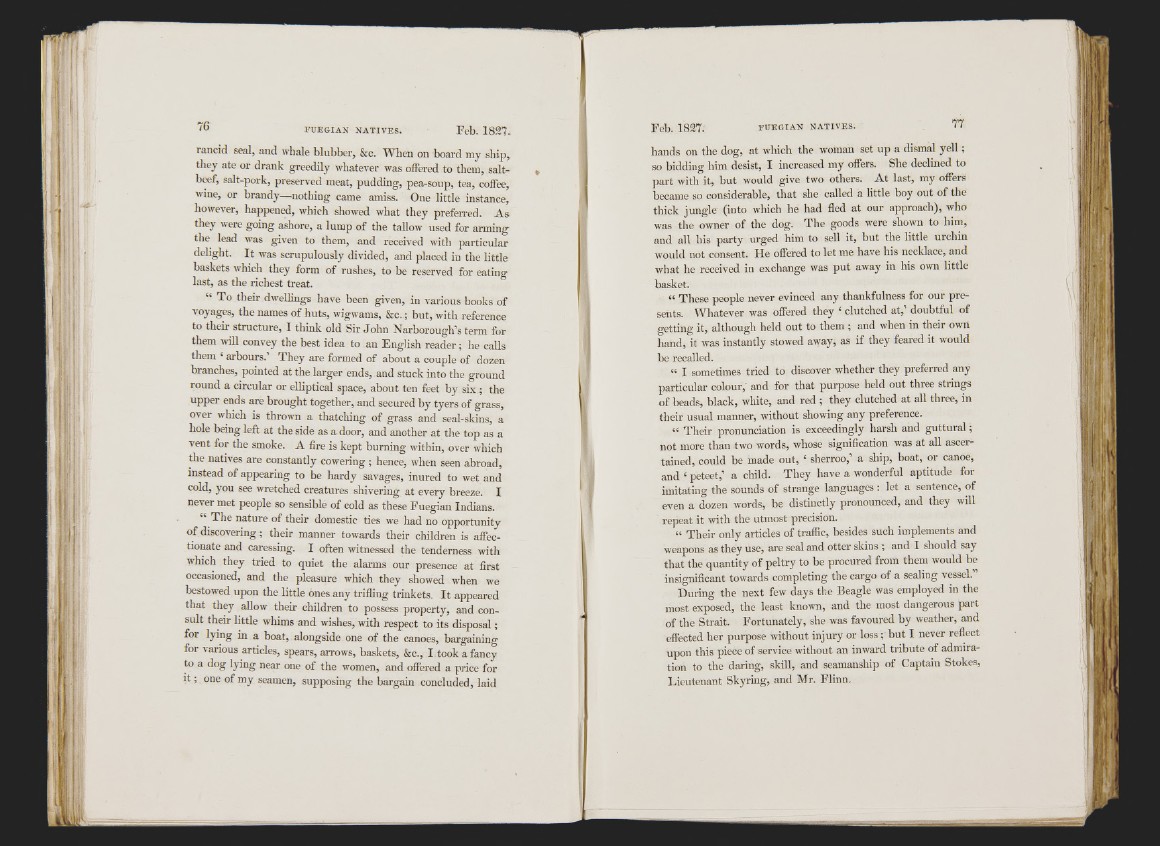
-■ ;h ;
M! i '■’
rancid seal, and whale blubber, &c. When on hoard my ship,
tliey ate or drank greedily whatever was offered to them, salt-
href, salt-pork, preserved meat, pudding, pea-soiip, tea, coffee,
wine, or brandy—nothing came amiss. One little instance,
however, happened, which showed what they preferred. As
they were going ashore, a lump of the tallow used for arming-
the lead was given to them, and received with particular
delight. It was scrupulously divided, and placed in the little
baskets which they form of rushes, to be reserved for eating
last, as the richest treat.
“ To their dwellings have been given, in various books of
voyages, the names of huts, wigwams, &c.; but, with reference
to their structure, I think old Sir John Narborough’s term for
them iviU convey the best idea to an Fnglish reader; he calls
them ‘ arbours.’ They are formed of about a couple of dozen
branches, pointed at the larger ends, and stuck into the ground
round a circular or elliptical space, about ten feet by six ; the
upper ends are brought together, and secured by tyers of grass,
over which is thrown a thatching of grass and seal-skins, a
hole being left at the side as a door, and another at the top as a
vent for the smoke. A fire is kept burning within, over which
the natives are constantly cowering; hence, when seen abroad,
instead of appearing to be hardy savages, inured to wet and
cold, you see wretched creatures shivering at every breeze. I
never met people so sensible of cold as these Fuegian Indians.
The nature of their domestic ties we had no opportunity
of discovering; their manner towards their children is affectionate
and caressing. I often witnessed the tenderness with
which they tried to quiet the alarms our presence at first
occasioned, and the pleasure which they showed when we
bestowed upon the little ones any trifling trinkets. It appeared
that they allow their children to possess property, and consult
their little whims and wishes, with respect to its disposal;
for lying in a boat, alongside one of the canoes, bargaining
for various articles, spears, arrows, baskets, &c., I took a fancy
to a dog lying near one of the women, and offered a price for
i t ; one of my seamen, supposing the bargain concluded, laid
hands on the dog, at which the woman set up a dismal y e ll;
so bidding him desist, I increased my offers. She declined to
part with it, but would give two others. At last, my offers
became so considerable, that she called a little boy out of the
thick jungle (into which he had fled at our approach), who
was the owner of the dog. The goods were shown to him,
and all his party urged him to sell it, hut the little urchin
would not consent. He offered to let me have his necklace, and
what he received in exchange was put away in his own little
basket.
“ These people never evinced any thankfulness for our presents.
Whatever was offered they ‘ clutched at,’ doubtful of
getting it, although held out to them ; and when in their own
hand, it was instantly stowed away, as if they feared it would
be recalled.
“ I sometimes tried to discover whether they preferred any
particular colour,' and for that purpose held out three strings
of beads, black, white, and red ; they clutched at all three, in
their usual manner, without showing any preference.
“ Their pronunciation is exceedingly harsh and guttural;
not more than two words, whose signification was at all ascertained,
could be made out, ‘ sherroo,’ a ship, boat, or canoe,
and ‘ peteet,’ a child. They have a wonderful aptitude for
imitating the sounds of strange languages : let a sentence, of
even a dozen words, be distinctly pronounced, and they will
repeat it with the utmost precision.
“ Their only articles of traffic, besides such implements and
weapons as they use, are seal and otter skins and I should say
that the quantity of peltry to he procured from them would be
insignificant towards completing the cargo of a sealing vessel.”
During the next few days the Beagle was employed in the
most exposed, the least known, and the most dangerous part
of the Strait. Fortunately, she was favoured by weather, and
effected her purpose without injury or loss ; but I never reflect
upon this piece of service without an inward tribute of admiration
to the daring, skill, and seamanship of Captain Stokes,
IJeutenant Skyring, and Mr. Flinn.